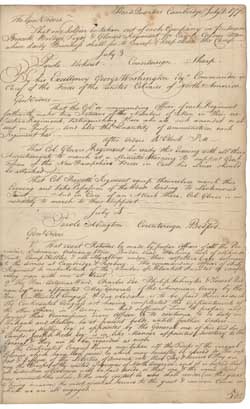Collections Online
Artemas Ward orderly book, 3-8 July 1775
To order an image, navigate to the full
display and click "request this image"
on the blue toolbar.
-
Choose an alternate description of this item written for these projects:
- Main description
[ This description is from the project: Coming of the American Revolution ]
"The General most earnestly requires"
Washington arrives in Cambridge and begins to take stock of the troops and supplies now under his command. His initial reaction is far from favorable. Later in September he records his first impressions, saying that he finds the true situation of the troops very different from what is advertised. They come from towns and villages all across the colonies, and scarcely one can agree on the same rules for functioning as another. From his very first day in charge he begins issuing new sets of general orders, which are dutifully copied down and distributed by his orderlies to his officers. Artemas Ward, now officially a Major General, keeps careful notes of all the new General's rules and requirements in his Orderly Book.
Washington arrives in Cambridge and begins to take stock of the troops and supplies now under his command. His initial reaction is far from favorable. Later in September he records his first impressions, saying that he finds the true situation of the troops very different from what is advertised. They come from towns and villages all across the colonies, and scarcely one can agree on the same rules for functioning as another. From his very first day in charge he begins issuing new sets of general orders, which are dutifully copied down and distributed by his orderlies to his officers. Artemas Ward, now officially a Major General, keeps careful notes of all the new General's rules and requirements in his Orderly Book.
Questions to Consider
1. What does it tell you about the state of the soldiers' camp that Washington has to give some of these orders?
2. Do you think the soldiers from different colonies got along? What evidence from the orderly book supports your opinion?
3. What regiment does Washington seem to favor? What kinds of duties does he give them?
4. What do parole and countersign mean?
5. Why would Washington forbid the firing of "small arms and Cannon?" What information might he have gathered from his earlier orders that would prompt this order?
6. How does Washington seek to unify his troops and give them a new identity? What language does he use?
Further Exploration
7. What is the British Army in Boston doing during this same time? Is it possible to find out what kinds of orders the officers give and record? Are they issuing any proclamations or public statements?
8. What are people's reactions to Washington's early commands? Look at the letters and diaries of John and Abigail Adams: do the Adamses record their impressions of Washington? What about Washington's officers: do any of them leave letters or journals that might tell us how they reacted?
1. What does it tell you about the state of the soldiers' camp that Washington has to give some of these orders?
2. Do you think the soldiers from different colonies got along? What evidence from the orderly book supports your opinion?
3. What regiment does Washington seem to favor? What kinds of duties does he give them?
4. What do parole and countersign mean?
5. Why would Washington forbid the firing of "small arms and Cannon?" What information might he have gathered from his earlier orders that would prompt this order?
6. How does Washington seek to unify his troops and give them a new identity? What language does he use?
Further Exploration
7. What is the British Army in Boston doing during this same time? Is it possible to find out what kinds of orders the officers give and record? Are they issuing any proclamations or public statements?
8. What are people's reactions to Washington's early commands? Look at the letters and diaries of John and Abigail Adams: do the Adamses record their impressions of Washington? What about Washington's officers: do any of them leave letters or journals that might tell us how they reacted?

